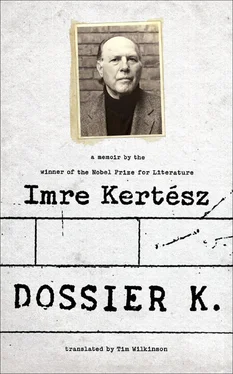The subject of the novel is enclosure, that’s for sure, and that has formal consequences. In essence, it’s a matter of a musical structure that is followed as a structural principle.
You assign a big part to music in the construction, or I should say the composition, of your novels .
I don’t think that can be of interest to anyone except myself, but it’s true that I like to conceive of my novels in terms of a musical composition.
In other words, it’s not just a matter of the musicality of individual sentences …
No, of the whole, of the complete composition. With Fiasco , for instance, the beginning and end of the novel overlap, but this is achieved with musical tools: the images of the “enlightenment” and the L-shaped corridor are snapped twice by the text, then the third time they come true … but those are just my own distinctly dubious private amusements and can only be boring to readers.
Not to me, that’s for sure, because I would like to find my bearings in what is perhaps the most enigmatic of your novels. With Fatelessness you employed a simple linear technique …
That was not exactly simple, either, but in that instance the linear technique expressed some important ideas. With Fiasco , on the other hand, I made a deliberate effort to “transcribe” the time-planes onto one another, and, just like music, the novel, too, unfolds over time, and in that way a circular novel structure came into being.
A circle that encloses within itself both the Nazi concentration camp and the Communist jails .
Yes, in the end I wanted to pluck out the danse macabre of the two regimes on a single string, despite the fact that I wrote and published Fiasco before the change in regime and therefore when censorship was still very much in force.
Toward the end of Fiasco, Köves sends a letter to Berg, who is one of the most mysterious of all the novel’s figures, in which he relates his strange experiences. In addition, this is where Köves, for the first and only time in the novel, speaks in the first person singular, which lends an air of confessional authenticity to the text …
So, we’re again mooring by the unfathomable relationship between fiction and reality, yet we already covered that at the very start of our conversation. Only now I get the impression that you are not quite so sure of yourself as you were then.
Well, I’m frightened that you are going to tell the truth …
Never doubt it!
All right, then, let’s start off from the previous chapter of “Fiasco”, the novel-in-the-novel, where we learn that Köves has been in the army “because the same post as the dismissal letter from the ministry had also brought a demand that he immediately discharge his deferred military service.” When did that happen in your case?
In November 1951 I was called up for regular military service, and after the three months of so-called “basic training” it turned out that the military command had singular plans for the unit to which I had been posted …
“Yet what a filthy dream did I wake up to all at once! I am standing in a room by a desk behind which is seated an obese, hormonally challenged bonehead, with matted hair, rotting teeth, bags under his eyes, and a sneer on his face: a major, and what he wants is for me to put my signature at the bottom of a piece of paper and accept a post as a prison guard in the central military prison.” What that sounds like is that Köves, on the model of many other literary figures, is about to enter a contract with the Devil …
It’s not a huge difference in principle.
If I look on it as a literary game. But here, as it is said in one of Wedekind’s plays, “we’re not playing but living.” So, why does Köves sign the paper?
Out of ignorance, curiosity, and, above all, existential apathy.
“… my existence went to sleep, or was paralyzed inside me, or at any rate it gave no twinge of unease to warn me of the importance of the decision,” writes Köves, or is that you?
I write “the Old Boy” who writes Köves, who in turn writes the letter addressed to Berg.
“That was when I raised my hand and struck a defenceless prisoner in the face”—who writes that?
Köves.
And Köves is who, exactly?
You can’t be serious. “I am Madame Bovary”—for any lesser risk it’s better if one doesn’t sit down to write a novel.
It seems that I’m not only lacking something in the humour department but in the horror department as well. I don’t know you to be the sort of person who would strike somebody in the face .
You can’t know, just as Köves does not know himself: we spoke about that earlier on when we talked about him being concealed in his insignificance. Here you, the reader, step with Köves into a world where the aimlessly stumbling personality has no foothold, and if your “existence has gone to sleep,” it is easy to make — or let’s say rather: it can easily happen —the first and decisive step, from which there is no turning back.
If one accepts that argument, then it would be impossible to call any mass murderer to account .
You are forgetting that as a writer I am not concerned with calling people to account but with accurate portrayal. In any case, I — and the “I” here is an unknown factor, a passivity — so, I was lucky and I was not exposed to any haunting moment like that.
Do you really think it is just a matter of luck?
I don’t know. On the basis of the experiences I gained in camps and dictatorships, the resilience of human nature is inexhaustible. When I wrote that novel — almost thirty years after the fact — I certainly had to ponder the possibility of such a moment. In the last analysis, the imagination is also a kind of reality, and if I really wished to respond to the issues raised in the novel, then I had to carry out in my imagination things that had not happened in reality if only in order that the fictional Köves should experience the “definitive act” and place it at Berg’s disposal.
Before we began this conversation, I sat down to re-read “I, the Executioner,” the novel-in-the-novel-in-the-novel of Fiasco, which provides an apology for mass murder. Do I understand correctly that the state when a person is freed from his own personality and completely subsumes it to the executioner’s role is one that Berg calls grace?
Or that of the victim. “It might perhaps be pleasant to be alternately victim and executioner,” Baudelaire remarks in My Heart Laid Bare on the basis of who knows what earlier experiences he may have had. The essence of both roles is a complete release from the burden of personality — that is why Berg is searching for a “definitive act” that would set the executioner on the “salvational” route of mass murder.
What do you mean here by a “definitive act”?
It’s an act which does not ensue from the propensities, character, or individuality of the person concerned but solely from the situation, which commands the terrain like a foreign power. The moment takes command, and you get out of it as best you can. You have to free yourself of the colossal tension: all of a sudden, you cave in and abandon any resistance — relinquish yourself to the line of least resistance, one could say.
Is this not the same thing as what elsewhere you refer to as fatelessness?
In essence the same thing; it’s just that the idiom employed in Fiasco is different.
There it is referred to as “grace,” and it is given a positive connotation. Why is that?
Читать дальше












